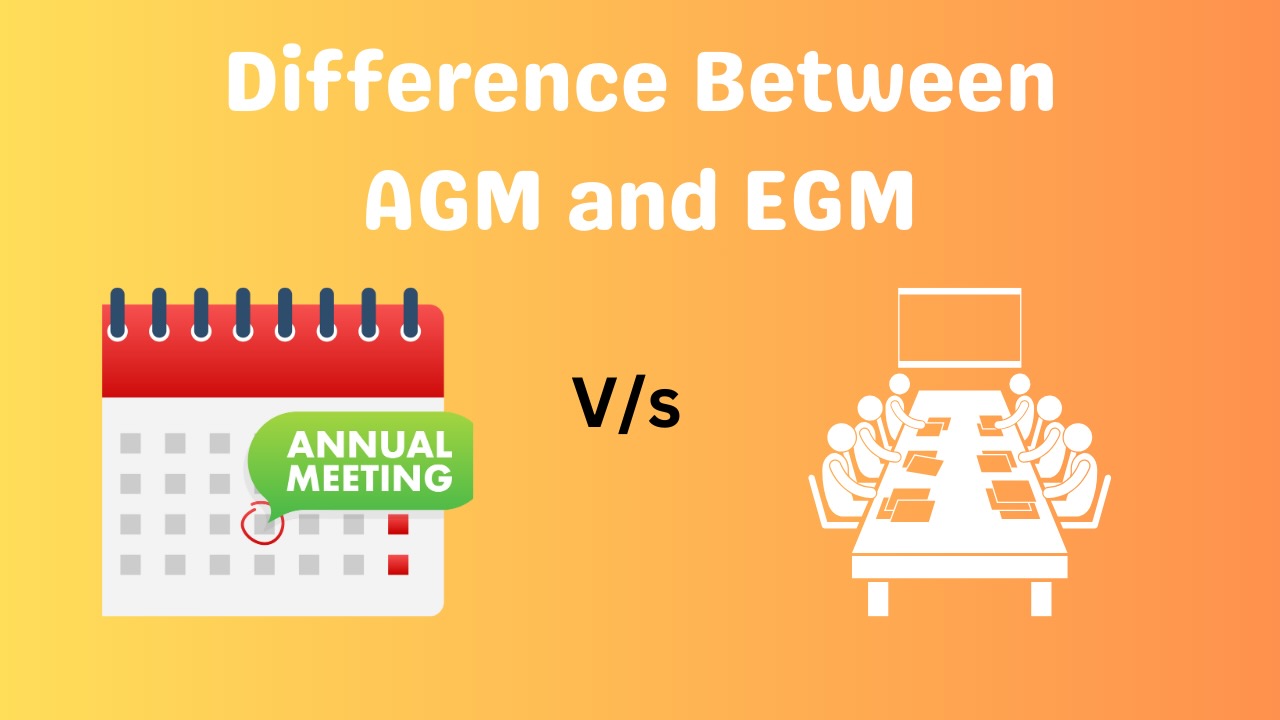Difference Between AGM and EGM: Members of a company or the directors of a company can exercise their powers and can bind the company only when they act as a body at a validly convened and held meeting. An individual member or shareholder, irrespective of his shareholding cannot bind a company by his individual act.
The decision making powers of a company are vested in the Members and the Directors and they exercise their respective powers through Resolutions passed by them. General Meetings of the Members provide a platform to express their will in regard to the management of the affairs of the company. Must Check How to apply for DIN.?
A meeting may be generally defined as a gathering or assembly or getting together of a number of persons for transacting any lawful business. There must be atleast two persons to constitute a meeting. Therefore, one shareholder usually cannot constitute a company meeting even if he holds proxies for other shareholders. However, in certain exceptional circumstances, even one person may constitute a meeting.
Quick Links
Difference Between AGM and EGM
Annual General Meeting (AGM)
Annual general meeting (AGM) is an important annual event where members get an opportunity to discuss the activities of the company. Section 96 provides that every company, other than a one person company is required to hold an annual general meeting every year. SS-2 provides that the Board shall, every year, convene or authorize convening of a meeting of its members called the Annual General Meeting to transact items of ordinary business specifically required to be transacted at an annual general meeting as well as special business, if any.
If the Board fails to convene its Annual General Meeting in any year, any Member of the company may approach the prescribed authority, which may then direct the calling of the Annual General Meeting of the company.
Extra Ordinary General Meeting (EGM)
There are so many matters relating to the business of a company, which requires approval or consent of members in general meetings. It is always not possible for consideration of such matters to wait until the next annual general meeting. The articles of association of the company of the company make provisions for convening general meetings other than the annual general meeting. All general meetings other than annual general meeting are called extraordinary general meetings.
Difference Between AGM and EGM
| AGM | EGM |
| First AGM should be held within 9 months of incorporation | No such stipulation |
| AGM has to be held at least once in a year | No such stipulation |
| Ordinary business can be conduction in AGM only | Ordinary business cannot be conducted in EGM. Only special business can be conducted in EGM |
| Can be held on any day except National Holiday | Can be held on any day including National Holiday |
| Can be held during business hours only | Can be held at any time during the day |
| If AGM is not held, company and officer be liable to penalty of upto Rs. 1,00,000 and Rs. 5,000 per day | No such penalty prescribed under the law |
| AGM cannot be held on requisition by members | EGM can be held on requisition by members |
Class Meetings
Meetings of members of a company fall into two broad divisions, namely, general meetings and class meetings. Class meetings are meeting of shareholders, holding a particular class of share which is held to pass a resolution which will bind only the members of the class concerned. Only members of the class concerned may attend and vote at the meeting. Usually, the rules to voting apply to class meetings as they govern voting at general meetings. These class meetings must be convened whenever it is necessary to alter or change the rights or privileges of that class as provided by the articles.
For effecting such changes, it is necessary that these are approved at a separate meeting of the holders of those shares and supported by a special resolution. Under section 48 of the Companies Act, 2013 (variation of shareholders’ rights) class meetings of the holders of different classes of shares shall be held if the rights attaching to these shares are to be varied. Similarly, under Section 232 (Merger and Amalgamation of companies), where a scheme of arrangement is proposed, meeting of several classes of shareholders and creditors are required to be held.
Other Relevant Articles







